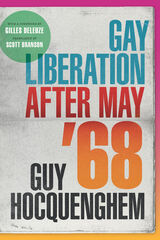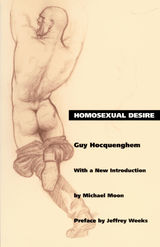3 books about Hocquenghem, Guy

Gay Liberation after May '68
Guy Hocquenghem
Duke University Press, 2022
In Gay Liberation after May ’68, first published in France in 1974 and appearing here in English for the first time, Guy Hocquenghem details the rise of the militant gay liberation movement alongside the women’s movement and other revolutionary organizing. Writing after the apparent failure and eventual selling out of the revolutionary dream of May 1968, Hocquenghem situates his theories of homosexual desire in the realm of revolutionary practice, arguing that revolutionary movements must be rethought through ideas of desire and sexuality that undo stable gender and sexual identities. Throughout, he persists in a radical vision of the world framed through a queerness that can dismantle the oppressions of capitalism and empire, the family, institutions, and, ultimately, civilization. The articles, communiques, and manifestos that compose the book give an archival glimpse at the issues queer revolutionaries faced while also speaking to today’s radical queers as they look to transform their world.
[more]

Guy Hocquenghem
Beyond Gay Identity
Bill Marshall
Duke University Press, 1997
Although Homosexual Desire, first published in French in 1972 and in English in 1978, has become a classic in gay male theory, no full-length study of its author, Guy Hocquenghem, has been available in English until now. From the rise of the international gay liberation movement of the late 1960s to Hocquenghem’s AIDS-related death in 1988, Bill Marshall discusses the arguments and impact of Hocquenghem’s theoretical and political work while situating this work in its biographical, historical, and intellectual contexts.
Marshall explores all aspects of Hocquenghem’s writing—journalistic, theoretical, and fictional—much of this work still untranslated. His consideration reaches beyond the aftermath of the events of May 1968 and points toward the ways in which Hocquenghem’s work might invigorate contemporary debates on a range of issues in Marxist and queer theory and in gay, lesbian, and cultural studies. These include the construction of homosexuality in social discourse, the status of "identity politics," and the role of the state and civil society in the determination of each. Demonstrating Hocquenghem’s importance within the framework of French leftist thought, Marshall links him to his contemporaries Foucault, Deleuze, and Guattari. Tracing his connections to the intellectual traditions of Benjamin, Diderot, Fourier, Lucretius, and Gnosticism, he also illustrates Hocquenghem’s place within the European intellectual tradition.Guy Hocquenghem brings an important, challenging, and overly neglected French theorist back to the main stage.
Marshall explores all aspects of Hocquenghem’s writing—journalistic, theoretical, and fictional—much of this work still untranslated. His consideration reaches beyond the aftermath of the events of May 1968 and points toward the ways in which Hocquenghem’s work might invigorate contemporary debates on a range of issues in Marxist and queer theory and in gay, lesbian, and cultural studies. These include the construction of homosexuality in social discourse, the status of "identity politics," and the role of the state and civil society in the determination of each. Demonstrating Hocquenghem’s importance within the framework of French leftist thought, Marshall links him to his contemporaries Foucault, Deleuze, and Guattari. Tracing his connections to the intellectual traditions of Benjamin, Diderot, Fourier, Lucretius, and Gnosticism, he also illustrates Hocquenghem’s place within the European intellectual tradition.Guy Hocquenghem brings an important, challenging, and overly neglected French theorist back to the main stage.
[more]

Homosexual Desire
Guy Hocquenghem
Duke University Press, 1993
Originally published in 1972 in France, Guy Hocquenghem's Homosexual Desire has become a classic in gay theory. Translated into English for the first time in 1978 and out of print since the early 1980s, this new edition, with an introduction by Michael Moon, will make available this vital and still relevant work to contemporary audiences. Integrating psychoanalytic and Marxist theory, this book describes the social and psychic dynamics of what has come to be called homophobia and on how the "homosexual" as social being has come to be constituted in capitalist society.
Significant as one of the earliest products of the international gay liberation movement, Hocquenghem's work was influenced by the extraordinary energies unleashed by the political upheavals of both the Paris "May Days" of 1968 and the gay and lesbian political rebellions that occurred in cities around the world in the wake of New York's Stonewall riots of June 1969.
Drawing on the theoretical work of Gilles Deleuze and Félix Guattari and on the shattering effects of innumerable gay "comings-out," Hocquenghem critiqued the influential models of the psyche and sexual desire derived from Lacan and Freud. The author also addressed the relation of capitalism to sexualities, the dynamics of anal desire, and the political effects of gay group-identities.
Homosexual Desire remains an exhilarating analysis of capitalist societies' pervasive fascination with, and violent fear of, same-sex desire and addresses issues that continue to be highly charged and productive ones for queer politics.
Significant as one of the earliest products of the international gay liberation movement, Hocquenghem's work was influenced by the extraordinary energies unleashed by the political upheavals of both the Paris "May Days" of 1968 and the gay and lesbian political rebellions that occurred in cities around the world in the wake of New York's Stonewall riots of June 1969.
Drawing on the theoretical work of Gilles Deleuze and Félix Guattari and on the shattering effects of innumerable gay "comings-out," Hocquenghem critiqued the influential models of the psyche and sexual desire derived from Lacan and Freud. The author also addressed the relation of capitalism to sexualities, the dynamics of anal desire, and the political effects of gay group-identities.
Homosexual Desire remains an exhilarating analysis of capitalist societies' pervasive fascination with, and violent fear of, same-sex desire and addresses issues that continue to be highly charged and productive ones for queer politics.
[more]
READERS
Browse our collection.
PUBLISHERS
See BiblioVault's publisher services.
STUDENT SERVICES
Files for college accessibility offices.
UChicago Accessibility Resources
home | accessibility | search | about | contact us
BiblioVault ® 2001 - 2024
The University of Chicago Press









